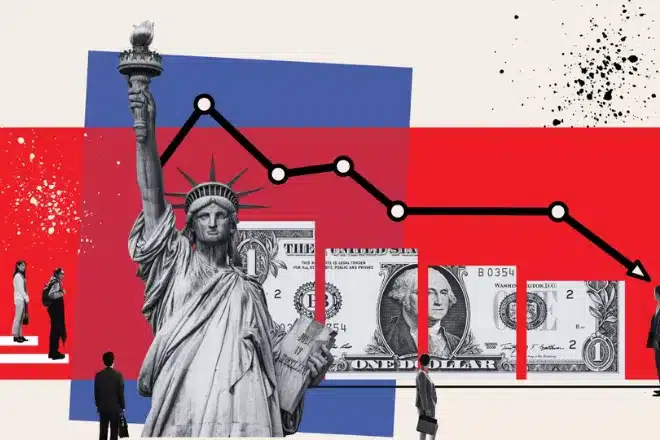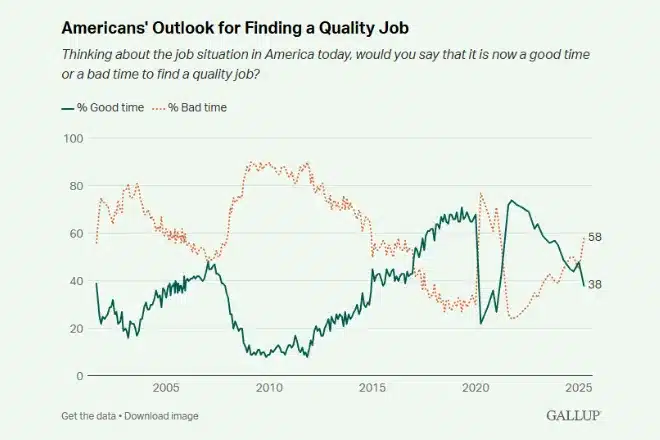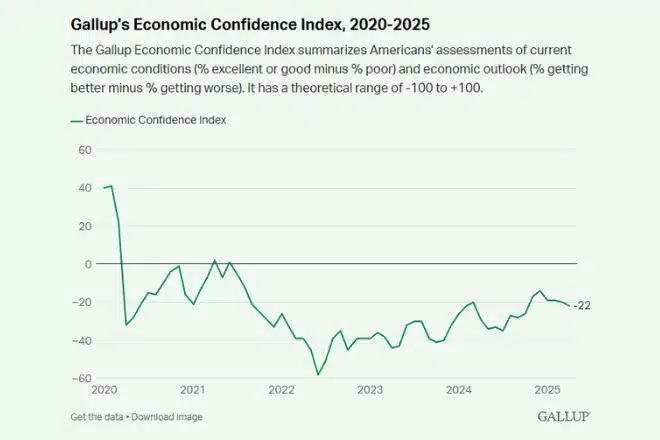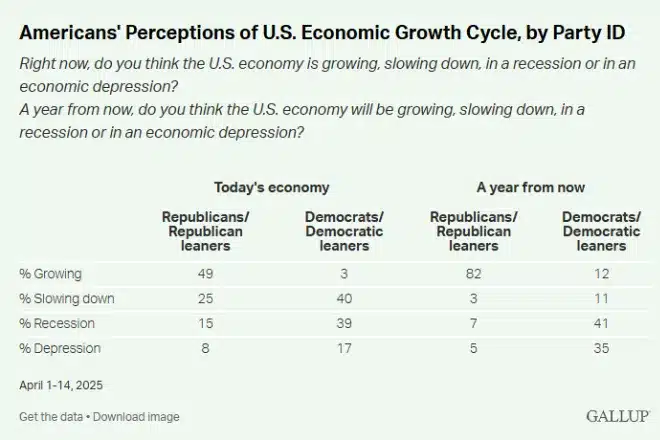Americans’ economic confidence has plummeted dramatically in April 2025, marking a stark reversal from the post-inauguration optimism that characterized the early days of President Trump’s second term. A comprehensive Gallup survey reveals unprecedented levels of financial pessimism and growing concerns across all major economic indicators, from stock market performance to job market stability and personal financial security.
Contents
- 1 Americans’ Economic Sentiment Shows Sharp Deterioration Across Multiple Metrics
- 2 Americans’ Economic Anxiety Extends to Job Market
- 3 Record-Breaking Pessimism in Americans’ Economic Assessment of Personal Finances
- 4 Americans’ Economic Confidence Index Remains Negative Despite Relative Stability
- 5 Americans’ Economic Cycle Perceptions Reveal Growing Recession Fears
- 6 Sharp Partisan Divide Characterizes Americans’ Economic Outlook
- 7 Americans’ Economic Concerns Linked to Trade Policy Shifts
- 8 Implications of Deteriorating Americans’ Economic Sentiment
- 9 About H2T Finance
Americans’ Economic Sentiment Shows Sharp Deterioration Across Multiple Metrics
The latest Gallup Economy and Personal Finance survey, conducted April 1-14, documents a remarkable shift in Americans’ economic outlook over just three months. This annual assessment of consumer sentiment reveals troubling trends that could have significant implications for consumer spending, business investment, and overall economic growth in the coming months.

Stock Market Expectations Reverse Dramatically
One of the most striking shifts in Americans’ economic outlook concerns stock market expectations:
- Only 29% of Americans now expect the stock market to rise over the next six months, down dramatically from 61% in January
- A substantial 58% anticipate stock market declines, compared to just 18% expressing this concern in January
- This near-complete reversal represents one of the most dramatic shifts in investor sentiment Gallup has recorded
Economic Growth Forecasts Turn Decidedly Negative
Similarly, Americans’ expectations for broader economic growth have deteriorated significantly:
- Just 38% remain optimistic about U.S. economic growth over the next six months, down from 53% in January.
- 48% now predict economic contraction, up substantially from 29% earlier this year.
- The net optimism score has shifted from +24 points in January to -10 points in April.
Inflation Concerns Intensify Among Consumers
Already-present inflation worries have grown more pronounced:
- 63% of Americans now predict rising inflation in the coming months, an 11 percentage point increase from January.
- This heightened concern persists despite the Federal Reserve’s ongoing efforts to control price growth.
- Inflation expectations remain particularly elevated among lower and middle-income households.
Interest Rates and Unemployment Projections Worsen
The survey also reveals growing pessimism regarding other key economic indicators:
- 42% expect interest rates to increase further in the next six months.
- 47% anticipate rising unemployment, reflecting growing concerns about labor market stability.
- Both metrics show a significant deterioration from the mixed expectations recorded in January.
Americans’ Economic Anxiety Extends to Job Market
The April survey documents a marked deterioration in Americans’ perceptions of employment opportunities:
- 58% now believe it’s a bad time to find a quality job, up from 45% in January.
- Only 38% consider it a good time for job seekers, down from 48% at the beginning of the year.
- This represents the most pessimistic job market outlook since January 2021, when pandemic-related unemployment remained elevated.
- Workers across all sectors express increased anxiety about job security, with particular concerns in manufacturing and retail.

Record-Breaking Pessimism in Americans’ Economic Assessment of Personal Finances
Perhaps most concerning for policymakers and economists is the unprecedented level of pessimism Americans express about their financial situations:
Current Financial Status Remains Subpar
Americans’ assessment of their current financial standing shows continued weakness:
- 10% rate their financial situation as excellent.
- 34% consider it good.
- 37% describe it as only fair.
- 18% report poor financial conditions.
While these figures closely mirror last year’s ratings, they remain significantly below the historical average. Since Gallup began tracking this metric in 2001, an average of 50% of Americans have rated their finances as excellent or good, with positive perceptions peaking at 57% in 2021 during the post-pandemic recovery.
Financial Trajectory Shows Historic Pessimism
The most alarming finding concerns Americans’ perception of their financial direction:
- A record-high 53% now believe their financial situation is worsening.
- Only 38% say their finances are improving.
- The resulting -15 point net optimism score represents the most negative reading in Gallup’s tracking history dating back to 2001.
- This marks the first time a majority of Americans have expressed pessimism about their financial trajectory.
This financial pessimism spans demographic groups:
- The six-point increase in pessimism over the past year is consistent across household income levels.
- Both stock owners and non-owners report similar increases in financial anxiety.
- Rural and urban residents alike express heightened concern about their financial futures.
See more related articles:
Americans’ Economic Confidence Index Remains Negative Despite Relative Stability
Despite the sharp deterioration in specific economic indicators, Gallup’s Economic Confidence Index (ECI) shows more stability:
- April’s ECI stands at -22, compared to -20 in March and -19 in January.
- This represents a modest eight-point decline from December’s -14 reading.
- While consistently negative since mid-2021 when inflation began surging, the index remains stronger than most readings from the previous four years.

The ECI summarizes Americans’ evaluations of current economic conditions and outlook, with a theoretical range from +100 (universal optimism) to -100 (universal pessimism). Historically, the index peaked at +56 in January 2000 during the dot-com boom and reached its nadir at -72 in October 2008 during the global financial crisis.
Americans’ Economic Cycle Perceptions Reveal Growing Recession Fears
When asked to position the economy within the standard business cycle, Americans express significant concerns:
Current Economic Status
Views on the economy’s current phase show growing pessimism:
- 25% believe the economy is currently growing.
- 33% perceive it’s slowing down.
- 27% say it’s in recession.
- 15% believe it’s in economic depression.
These figures compare unfavorably to January 2019, midway through Trump’s first term, when 41% said the economy was growing and only 17% thought it was in recession or depression.
One-Year Economic Forecast
Looking ahead, Americans remain divided about the economic outlook:
- 45% predict the economy will be growing in a year.
- 7% anticipate it will be slowing down.
- 47% foresee recession or depression within a year (including 27% predicting recession and 20% anticipating depression).
This represents the first time in Gallup’s tracking that the combined percentage expecting recession or depression (47%) equals the percentage forecasting growth (45%). It also marks the first time more than a third of Americans predict recession or depression a year ahead.
Sharp Partisan Divide Characterizes Americans’ Economic Outlook
The survey reveals stark political polarization in economic assessments, with dramatic shifts following the presidential transition:
Current Economic Perceptions
Gallup finds striking differences by political affiliation:
- Republicans and Republican-leaning independents: 49% see current growth, while 48% perceive slowdown (25%), recession (15%), or depression (8%).
- Democrats and Democratic-leaning independents: Only 3% see current growth, while 96% perceive slowdown (40%), recession (39%), or depression (17%).

Economic Expectations for 2026
Predictions for the next year are heavily shaped by partisanship:
- Republicans: 82% predict economic growth a year from now.
- Democrats: 76% foresee recession (41%) or depression (35%).
Personal Financial Outlook by Political Affiliation
Partisan shifts in financial optimism have been particularly dramatic:
- Republican pessimism about personal finances has fallen 40 percentage points since Biden’s presidency.
- Democratic pessimism has surged 55 percentage points since Trump took office.
- Independents show a smaller but still significant increase in financial anxiety.
Americans’ Economic Concerns Linked to Trade Policy Shifts
The timing of this deterioration in Americans’ economic sentiment coincides directly with significant trade policy announcements by the Trump administration:
- Most of the survey was conducted after President Trump announced his “Liberation Day” tariffs on April 2, 2025.
- These tariffs target numerous countries and have been framed as protection for American industries.
- Major stock indices declined 4-5% during the two-week survey period amid increased market volatility.
- Growing tensions with China have raised concerns about an escalating trade war.
The administration has characterized higher prices and market volatility as necessary short-term adjustments for achieving long-term economic strength, arguing that these policies will revitalize American manufacturing and improve economic security. However, the survey data indicates most Americans remain unconvinced, with concerns about immediate economic pain outweighing optimism about potential future benefits.
Implications of Deteriorating Americans’ Economic Sentiment
The dramatic decline in Americans’ economic outlook could have significant consequences across several domains:
Consumer Spending
Reduced confidence could translate to weaker spending:
- Record pessimism about personal finances typically correlates with reduced consumer spending.
- Retail, hospitality, and discretionary sectors may face particular challenges if this sentiment persists.
- The upcoming summer shopping season could underperform expectations.

Business Investment
Worsening sentiment could impact business activity:
- Negative economic growth expectations often lead businesses to delay capital investments.
- Job creation may slow as companies adopt more conservative hiring approaches.
- Supply chain restructuring efforts could accelerate as firms respond to trade policy shifts.
Market Volatility
Investor uncertainty could keep markets unstable:
- Continued pessimism among investors could contribute to ongoing market instability.
- Defensive investment positioning may increase across portfolios.
- Retirement confidence could erode as market uncertainty persists.
Policy Challenges
The administration faces mounting pressure to justify its economic strategy:
- The administration faces growing pressure to demonstrate economic benefits from its trade policies.
- Consumer sentiment will be closely monitored as a leading indicator of potential recession risk.
- Partisan polarization in economic outlook complicates messaging and policy implementation.
As President Trump’s second term unfolds, Americans’ economic sentiment will serve as a critical barometer for evaluating the effectiveness of his administration’s economic agenda and forecasting consumer behavior in the months ahead. The historic levels of financial pessimism reflected in the Gallup survey underscore the significant economic headwinds that may influence both policy debates and market dynamics throughout 2025.
About H2T Finance
H2T Finance delivers real-time financial news, keeping you up to date with market movements, policies, and global economic events. As part of H2T Media Group, we are committed to providing accurate information and in-depth analysis, helping investors make quick, confident decisions in an ever-changing financial landscape.
For inquiries or personalized assistance, feel free to contact us:
📞 Phone: +84933.948.888
📧 Email: [email protected]
📍 Address: 4/567 Tổ 10 Khu Phố Hòa Lân 1, Thuận An, Bình Dương, Vietnam
At H2T Finance, your success is our priority.
